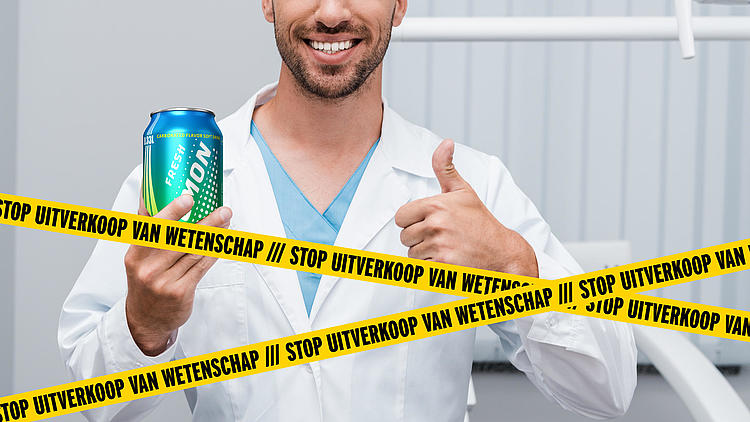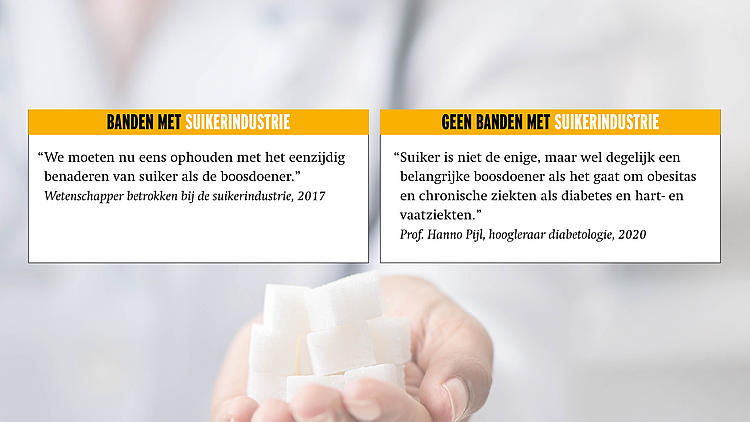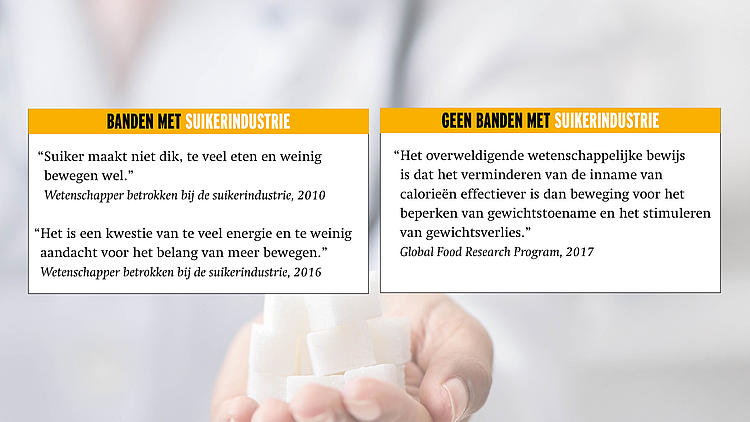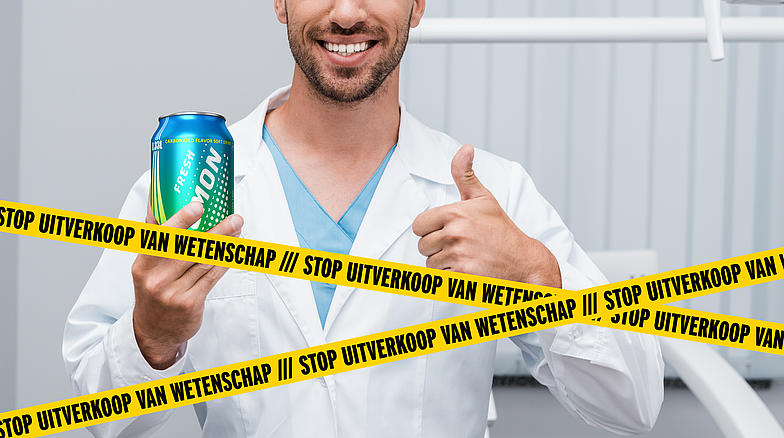New research report: Dutch sugar industry influences scientists
- Suiker Vet & Co
- Uitverkoop van wetenschap

Lack of transparency about industry ties
- New research carried out by foodwatch reveals that the Dutch sugar industry, through the Knowledge Centre for Sugar and Nutrition (Kenniscentrum Suiker en Voeding, KSV), uses broadly the same strategies as 'Big Tobacco' to influence science.
- Nine Dutch scientists have strong ties to KSV.
- All nine scientists make public statements in line with the interests of the sugar industry: in scientific publications, KSV publications, YouTube videos, congresses, workshops and the media.
- In the case of six of the nine scientists there was (at several times) insufficient transparency about their involvement with KSV at that time.
Elif Stepman from foodwatch: "Now that we are facing an obesity epidemic, we really cannot have scientists being used to downplay the risks of sugar consumption.”
Click here for the report 'Big Sugar' in the Netherlands: The merger between scientists and the sugar industry and the summary (both in Dutch).
Scientists used by the sugar industry
New research by foodwatch reveals that 'Big Sugar' in the Netherlands uses broadly the same strategies as 'Big Tobacco' to influence science. These strategies are effectively: nine Dutch scientists publicly place sugar in a more positive light, trivialise the risks, criticise measures to reduce sugar consumption, and so on. This can disrupt the scientific consensus, influence food policy and confuse consumers.
These nine scientists are involved with the sugar industry through the Knowledge Centre for Sugar and Nutrition (Kenniscentrum Suiker en Voeding, KSV). KSV is financed by the company Suiker Unie (Sugar union, recently changed to 'Cosun Beet Company') and, according to its own articles of association, its purpose is 'to look after the interests of the sugar industry'.
Big Tobacco' strategies
1. Funding research(ers)
Numerous studies prove that financing scientific studies and/or scientists can lead to industrial influence. Foodwatch's research shows that nine Dutch scientists have strong ties with KSV and therefore also with the sugar industry. Eight scientists have definitely been financed by KSV in the past fifteen years, and one likely. Several scientists worked on KSV publications (6), are or have been part of KSV's scientific council (3) and/or their editorial board (5). Eight of these scientists are or have been involved with ILSI: a well-known advocate of the sugar industry and unmasked as a lobby group in 2019.
2. Disseminating research if it supports their own interests, and criticising it if it does not
All nine scientists involved with (and/or funded by) KSV make public statements in line with the interests of the sugar industry: in scientific publications, KSV publications (including YouTube videos), congresses and workshops. Foodwatch presented several of these arguments to (international) experts and food professionals, or consulted renowned institutes such as the World Health Organisation and Global Food Research Program. This demonstrates that scientists involved with KSV paint a very positive - and often debatable - picture about sugar in several cases.

- “We need to stop approaching sugar unilaterally as the culprit." Scientist involved with the sugar industry, 2017
- "Sugar is not the only culprit, but it is a major one when it comes to obesity and chronic diseases such as diabetes and cardiovascular diseases.” Prof. Hanno Pijl, Professor of Diabetology, 2020.
Click here for more examples and reactions from, among others, Prof. Marion Nestle, Prof Barry Popkin, Jamie Oliver, Prof. Aart Jan van der Lelij and prof Prof. Jaap Seidell (in Dutch).
3. Using the press and media to represent their own interests
Five of the nine scientists also represent the interests of the sugar industry in the media. In the case of four scientists there was a lack of transparency regarding possible conflicts of interest with KSV.
Articles in the media often have a wide reach. This can cause confusion about sugar on a large scale.

- "Sugar doesn't make you fat, too much food and too little exercise does." Scientist involved with the sugar industry, 2010
- "It's a question of too much energy and not paying enough attention to the importance of more exercise." Scientist involved with the sugar industry, 2016
- "The overwhelming scientific evidence is that reducing the intake of calories is more effective than exercise at limiting weight gain and encouraging weight loss.” Global Food Research Program, 2017
Click here for more examples (in Dutch).
4. Using favourable research results to lobby policymakers
Eight of the nine scientists involved with KSV have also been involved with international industry lobbying organisations: the European branch of the International Life Science Institute (ILSI) and/or World Sugar Research Organization (WSRO). Both organisations are known as sugar lobby organisations and are supported by large companies within the sugar industry.
5. Not being transparent about the involvement of the industry
Transparency about involvement with the industry is crucial. Everyone must be able to check whether there are any conflicts of interest - or at least be vigilant about them. For six of the nine scientists there was, at several points in time, insufficient disclosure of their involvement with KSV at that time, such as research funding, ancillary positions and other possible conflicts of interest. A seventh was not transparent about their ancillary positions at ILSI.
Stop the sale of science
According to foodwatch, research and research communication relating to products that are proven or potentially harmful, such as sugar, should be carried out by independent scientists and research bodies. Foodwatch wants an end to the sale of science and calls on the various players to take action by means of a manifesto.
- Click here for the report and a summary of the results.
- Click here for the manifesto.
- Click here for more information about the campaign 'Stop the sale of science'.
All links lead to Dutch texts.
